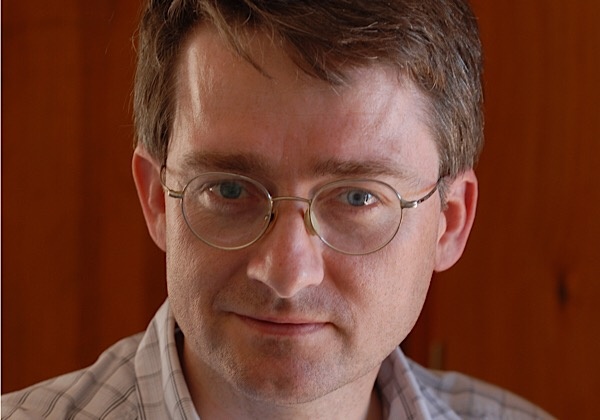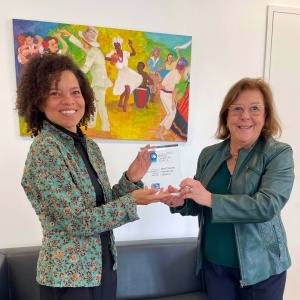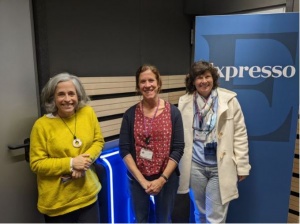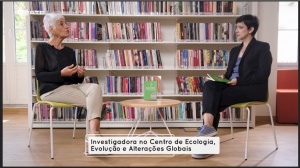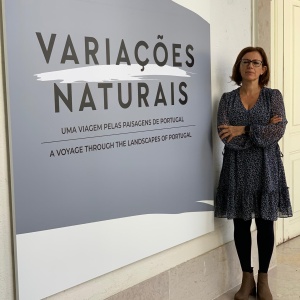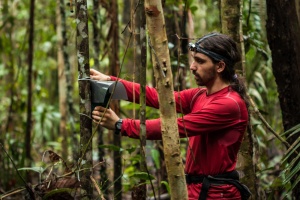16/06/2017.
Nota: Esta entrevista está disponível em Português aqui.
Interview by Marta Daniela Santos.
We are all very familiar with the global impacts of climate change and carbon dioxide emissions. But do you know there is another serious pollution problem taking place as we speak?
Nitrogen pollution is considered to be a major challenge for the 21st century, with multiple and interdependent impacts on a global scale. The good news is that there are things we can do in our everyday lives to contribute to its reduction.
In this interview, Mark Sutton (UK Centre for Ecology and Hydrology, Edinburgh) explains why nitrogen pollution is a serious ecological problem - and what can we do about it. Mark Sutton has been studying for more than three decades the emission, behaviour and fate of nitrogen in the atmosphere, leading several international projects on this subject. His work spans a wide range of disciplines, and recently he has focused on understanding the links between different nitrogen compounds in the environment.
Mark Sutton was an invited speaker of the training school “Global and long-term effects of nitrogen on ecosystems”, organized by cE3c-FCUL, which took place in Lisbon (Portugal) on May 15-26, 2017.
The public debate about major ecological changes is mostly focused on climate change and carbon dioxide emission. But nitrogen is one of the greatest challenges of this century, right? Why?
Well, we need nitrogen to live. One of the ways we feed the world population is with nitrogen fertilizers, and we estimate that, according to current diets, nitrogen is allowing half of the world population to be alive. So, without it we would be in a serious mess: we would be in very different diets and there would not be enough food.
Over 78% of our atmosphere is made of nitrogen, but it is two nitrogen molecules sitting together: N2, with a triple bond in the middle, which makes it extremely stable. Because it is non-reactive, we can't use it to grow anything to eat. Instead we use nitrogen in usable forms, such as ammonium, or ammonia, for example, forms which we call reactive nitrogen. If we take hydrogen (H2) and nitrogen (N2) and put it together in really high pressure and high temperature, a significant percentage comes out as ammonia, NH3. One chemical reaction, three Nobel Prizes: Fritz Haber [Nobel Prize in Chemistry in 1918], who discovered the reaction; Carl Bosch [Nobel Prize in Chemistry in 1931], who turned it into an industrial process, and most recently Gerhard Ertl [Nobel Prize in Chemistry in 2007], who identified and optimized the catalytic process so improving performance. This one reaction is leading to all this ammonia, producing the fertilizer that is keeping half of the world population alive.
Just like climate change, when we talk about the increase of CO2 for nitrogen we are talking about major changes over the last century. With the mass production of nitrogen fertilizers following the 1950s, we have doubled the amount of nitrogen compounds in the world. I would say that climate change is an easy issue. Maybe somebody else will not agree, but I say so because it is a single focal thing: burning things produces carbon dioxide, which leads to climate change. It is complicated to fix, but easy to explain. As for nitrogen, the problem is that it is everywhere and it is doing all sorts of things. It's like the godfather of pollution: you see the results but you don't see the godfather. [laughter]
It's a nice analogy!
And what are the impacts of nitrogen pollution at a global scale?
We use an acronym to help us remember, called WAGES. 'W' stands for 'water pollution'. When too much nitrate leaks into waters, you start reducing the quality of your drinking water. Also, when those nutrients get into the sea, you start losing biodiversity in the water: it causes an excess bloom of algae, that depletes the oxygen in the water and causes fish to die.
The second one is 'A', for 'air pollution'. First you have nitrogen oxides, which are toxic. Secondly, there is ammonia gas, which evaporates from fertilizers and manure and is toxic to plants.
The third one, 'G', stands for 'greenhouse gas'. Nitrous oxide, N2O, is a compound that results from the loss of these nitrogen compounds, and it is a greenhouse gas which is, per molecule, 300 times more powerful than carbon dioxide. The good news is that there is not so much of N2O as there is of CO2. But it is a very long-lived gas. So, once we have emitted it, it lasts in the atmosphere for several hundred years. And it is very challenging to reduce those emissions.
The 'E', for 'ecosystems'. After the nitrogen goes up into the atmosphere, it comes back down and lands on the natural vegetation. And sensitive flowers and sensitive mosses die. In my own country, some of the most sensitive things are the lichens and the mosses, which are really killed off the quickest.
And finally, there is 'S', for 'soils'. The soil, of course, is a mediator for a lot of changes. There are two things. One is that nitrogen can acidify the soil, which makes it less good for native species and for farming. The other thing about soil quality is that it's not only about too much or too little nitrogen; it's also about inequality. Some areas are saturated, while other areas in Africa are not getting enough: they're taking more nitrogen out of the soil than they're putting back in, depleting the soil and leading to soil erosion.
So, this is a multi-issue problem. And we normally know these issues, but we didn't know the godfather of pollution was affecting all of them. In Europe, the efficiency of the food system is about 20%. That means 80% is lost as pollution to the water, to the air, greenhouse gases, ecosystems, soils. We are running an extremely inefficient - and expensive - system.
One of the things we’ve done [published in the European Nitrogen Assessment] was to attempt to value the societal costs of nitrogen pollution in Europe. First, we got numbers between 70 billion and 320 billion euro per year, for Europe. We got good press awareness, but the politicians were not particularly interested. I think because they said well, you know, nobody is really paying those numbers. It is a smaller number that seems to appeal to the politicians better: the pure financial of the nitrogen that the farmer is losing. About 14 billion euro per year as actual cash loss due to nitrogen losses from European farming. As a comparison, the total agriculture subsidy in Europe is 57 billion euro. This means that 25% of the total European agriculture budget is lost as nitrogen pollution. Or, if you prefer this number: agriculture is 40% of the entire EU budget, which means that the nitrogen losses represent 10% loss of the entire budget of the EU.
That is a number that really appeals.
Yes, because it is real money at this point. Either way, our job is to make people aware. So, in fact, it took me three seconds to explain climate [change], and it takes me many more minutes to explain nitrogen pollution, but nitrogen is a very rich and diverse challenge. And it is a communication problem as well, because we need nitrogen to live, but it is leaking everywhere and causing all sorts of pollution, and you didn't know it was happening.
And what can be done to minimize this excess of nitrogen?
We're now working on that with the United Nations Environment Program. We have just set up a big program with about 80 partner institutions across the world, running for the next five years. It is called the International Nitrogen Management System (INMS). It is something equivalent to the Intergovernmental Panel on Climate Change (IPCC), but our job is to link the five aspects of WAGES. We are starting to bring together people from all those old disciplines that never used to talk with each other - air pollution, water pollution, greenhouse gases, and so on - and think about which management options can be good for several WAGES aspects.
We already identified a few important things to do. The first thing is: when you spread your fertilizer or manure, use a good spreading method with low emission techniques. This is really simple, the question is: why didn't we do it already? I think there is a whole social question there: some people do it, but many will not. The technology is available for many years, and depending on which method you use it can reduce emissions by 40% to 70%. Not only it is good for the air, but it is also more precise. This means that there will also be less overlap to watercourses, so it's also good for water pollution. Also, these methods are relatively cheap, and the farmer can immediately see the benefit.
Another source of nitrogen pollution is cars. There is a whole host of discussion, and scandals, on pollution coming out of cars. Car manufacturers have been pushed by regulation, but now they struggle to go further. But I look at this differently. I say that, when you are reducing nitrogen oxides emitted from cars, you are destroying a resource. Wait, is it pollution, or is it a resource? NOx is a form of nitrogen. What I say is that, instead of taking 1kg of nitrogen as NOx worth €1 and spending another euro to destroy it, having as a result nothing… let's capture it and use it for fertilizer. We are struggling with the technology to get it much further. The starting point would be with industries, big factories. So far nobody is doing it as a big scale business, but we must work and invest. The annual nitrogen oxide emissions in the world represent about 40 million tons of nitrogen [see Our Nutrient World, 2013], so that is about 40 billion dollars per year of resource that could be turned into a market.
Why are they not investing in this technology yet?
I think it's about narrow view mindset. We must change the mindset. For cars, imagine that you just had a cartridge that you put in your car and every ten thousand miles your garage man removes it and just puts it in the recycling bin. The recycling bin goes to be heated up, to get all the NOx off, and you could do this as part of a recycling policy. Again, the message of nitrogen is always integration.
Are there other examples of things that we can do in our daily lives to reduce nitrogen emission?
Yes: our food choices. With carbon dioxide and climate change, most of the problem has to do with energy - transports and electricity. But most of the nitrogen is associated with food, and that means that our food choices are incredibly powerful. We've assessed this in a report called 'Nitrogen on the table', in which we looked at what would happen with different food choices in Europe.
One of the central ways of looking at it was a demitarian scenario. 'Demi' means half, so, what if you're eating half of the meat and dairy but the same calories, because you mix other things as well? Just making the diet change alone would reduce our ammonia emissions in Europe by 40%, our greenhouse gas emissions by 20% to 40%, and our nitrogen water pollution by 40%. These are big changes.
According to the benchmark of the World Cancer Research Programs, we found that Europeans are eating 207% of our recommended intake of red meat. If we half with the demitarian appraoch, we go down to 107% of our recommended intake, so we are eating enough. We as scientists are not telling people to stop eating meat. Each person should be able to choose how much and what they eat. But if you would reduce by half, you would reduce your pollution by 40%. If all of us did that, we would would also double the nitrogen efficiency of the European system from 22 to over 40%. And maybe you would even save some money, which you can use to make your diet richer and more diverse.
That is actually what we do often in conferences - we work with the chef in advance. We did this in Edinburgh, where the chef decided to go down from 180g of meat per person to 60g per person. At the end, we had an exit survey - are you a high or low meat eater, or a “no meat eater”, and the key question: “Did you miss out on the amount of meat served?”. The answer was that 92% said that they did not miss out. [Of the remainder, 4% felt that not enough meat was served and 4% did not have a clear opinion].
We did this a couple of years later in Kampala, the capital of Uganda at the N2013 conference. And that was very interesting, because in Africa so many people do not have enough to eat. In Africa, it's not about the average, it's about the demographic structure: rich people have very high meat intake. As a comparison, the baseline in Edinburgh had been 180g of meat; in Kampala, as honored guests, we were given 270g of meat. And taking the demitarian approach we went down from 270g down to around 130g meat per person.
For several months in advance our partners in Africa worked with the conference hotel to assess what their normal diet was and to plan the menu for what we would be having with a lower meat intake. We went to half the meat intake, but we also had more food waste than a normal conference at the same venue. We found this very interesting, because it meant that people our delegates were accepting to eat less meat and even going beyond it, because they were not eating all of what they were given.
As I am hearing you talk about this I am thinking about potential applications – like in school canteens, for example.
Yes, absolutely. In Edinburgh we found that with less meat, we would spend less money. But instead of saving money we paid the same price, which allowed the conference chef to buy nicer, richer, more diverse ingredients. So, we didn’t save money but we prepared nicer meals. And everybody enjoyed the food. If you’re a school canteen, maybe you would go down the other route – and save money. But it offers you the choice to make.
So, it’s a win-win situation.
Absolutely. Now, some people who sell meat want to stop that. I remember one stakeholder saying that there is no reason why you should not eat as much meat as you like. Their argument is that there is no health risk associated with eating too much meat. This is a very contentious question, and I am not a health scientist. But I can tell you that, from the environmental perspective, the less meat we eat, the less pollution. This is interesting, because for many people food and health are more personal issues than the environment. We as citizens typically care more about our health than about the environment. But the environmental arguments are extremely solid. In this way, the health and environmental messages complement each other.
So, the goal is to make environment personal.
Yes! And I think that the food choice issue really does that, because each person can choose for themselves. The reason I wanted a new word, demitarian, was because with ‘vegetarian’ it is typically about all or nothing. But for the environmental argument, it is about how much. ‘Demi’ means a simple ambition – to go to half.
To conclude: you were invited to be one of the speakers of this training school [“Global and long-term effects of nitrogen on ecosystems”, 15-26 May 2017, Lisbon, Portugal]. What do consider to be the importance of these training schools?
Awareness. And what I am really excited about is that people at these training schools are coming from different backgrounds. One person will know about water, another one will know about ecosystems, and I am really encouraging them to cross over the boundaries, to learn about the perspective from somebody else’s area. We all have our own favorite topic. But if we are better aware, we can be more joined up in the future.

